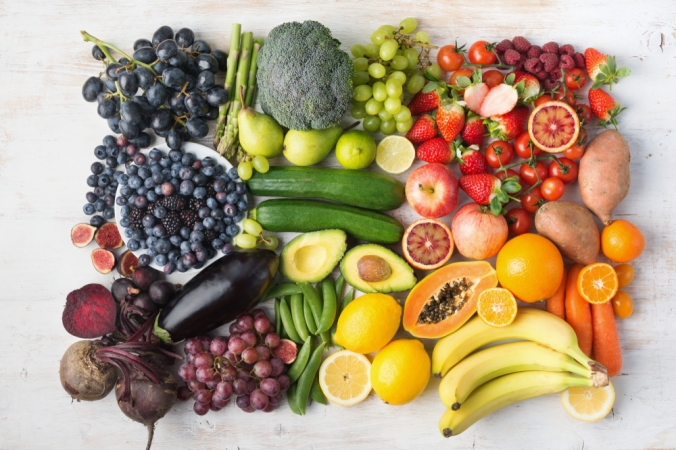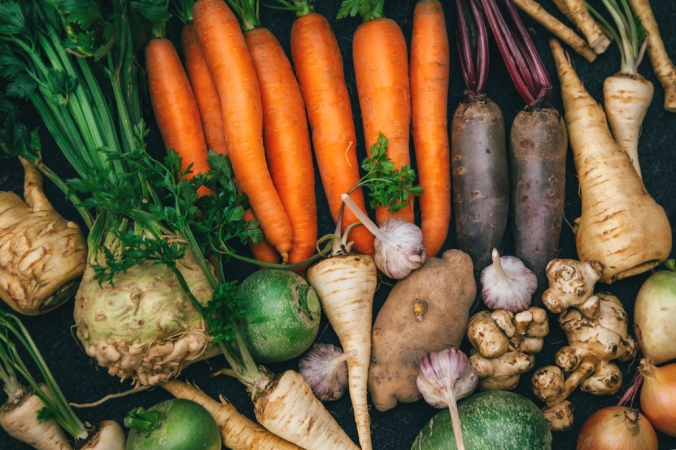
With the Festive Season rapidly approaching, we’re going to need all the energy we can muster to fully enjoy it!
However, it’s always best to eat with the seasons too, to keep in touch with nature’s cycles and eat more foods that are locally grown, thereby helping the planet too.
Clinical Nutritionist, Suzie Sawyer, shares five in-season foods that you’ll love and will boost energy levels too.
Pears
Pears tend to be synonymous with Christmas because they’re often poached with delicious spices, such as cinnamon and cloves. And if you’ve haven’t had poached pears before, then this year make it a first!
Pears often play second fiddle to apples, maybe because they tend to be juicier and perhaps less transportable as a snack. However, they are high in fruit sugars (although only 70 calories per pear on average) so provide some quick energy. Also, they’re loaded with vitamin C, which is not only great for the immune system but is needed for energy.

If poached pears aren’t for you, then why not serve them as a savoury starter, which will impress your guests, as griddled pears with goat’s cheese and hazelnuts are delicious
Pheasant
This game bird might not be for everyone but, as with all game, pheasant is very high in energising B vitamins. We’ve all seen pheasants charging round the fields and flying swiftly above our heads at this time of year. The fact that they’re so active makes them very low in calories and fat.

Game birds do tend to have a stronger flavour which may take some getting used to, but if they are hung for long enough to tenderise the meat, then there’s much to enjoy with pheasant.
They also provide a rich source of protein which can be used as an energy source by the body. All in all, you should feel pretty good after eating pheasant.
Brussels sprouts
At this time of year, we can’t fail to notice plenty of Brussels sprouts in the shops. And for some of us, the Festive Season isn’t quite right without them.

The good news is that Brussels sprouts are loaded with both vitamin C and folate, so you’ll really get an energy boost, but they also contain some amazing plant compounds which help protect the body from some of our nasty degenerative diseases. It’s a win-win for sure. Some people find them too bitter on their own which is why flash frying them with bacon can often make them much more acceptable in taste.
Chestnuts
If anything reminds us of Christmas, then it’s got to be chestnuts! These guys are higher in carbohydrates than other nuts, so are going to really help energy levels. However, they do contain slightly less protein and fat than their counterparts.

For many Europeans, chestnuts were an important staple food in the eighteenth and nineteenth centuries, such is the greatness of their nutritional profile. Watching Christmas lights, whilst eating a bag of roasted chestnuts seems like a pretty good way of getting into the festive spirit and finding an energy boost too.
Quince
Whilst it seems to be a somewhat ‘old fashioned’ fruit, it is still remarkably popular in jams and jellies and complements both sweet and savoury dishes. Importantly, you’ll find them in plenty of local farmer’s markets.

If it’s energy you’re looking for, then quince is going to provide plenty of vitamin C and energising iron.
What to do with quince? If you’re looking for inspiration, then they certainly blend well with spicy pears or what about cooking a warming, filling and highly nutritious beef and quince stew?
So, get energy-boosted and ready to fully enjoy the up-coming season by including some of these seasonal foods in your diet this December!
FOR MORE GREAT NUTRITION AND LIFESTYLE ADVICE:
Sign up to receive our blog and get a weekly dose of the latest nutrition, health and wellness advice direct to your inbox.
Follow us on Instagram @feelaliveuk or on Twitter @feelaliveuk for nutrition, lifestyle and well-being tips.
Visit us at www.feelaliveuk.com for the latest offers and exclusive Alive! content.
Follow and Chat with Suzie on Twitter @nutritionsuzie
For everything you need to know about vitamins, minerals and herbs visit our sister site Herbfacts
All images: Shutterstock






























